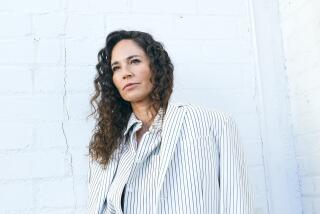A consumer’s guide to the best and...
- Share via
A consumer’s guide to the best and worst of sports media and merchandise. Ground rules: If it can be read, played, heard, observed, worn, viewed, dialed or downloaded, it’s in play here.
What: “Breaking Through: Our Turn to Play”
When: Thursday, 7 p.m., on Lifetime.
This is a welcome break from watching such Lifetime staples as “Unsolved Mysteries” or “Martha Stewart Living” and wondering what would happen if the shows were combined . . . Just who is responsible for deflating the chocolate souffle?
In any event, the one-hour special, hosted by actress Geena Davis, is designed to celebrate the 25th anniversary of Title IX. It is especially noteworthy for other not-so-obvious reasons. One is that the inaugural season of the Women’s National Basketball Assn. starts Saturday, and Lifetime, along with NBC and ESPN, will be televising WNBA games.
The other, by mere coincidence, was the controversy unleashed last week at Cal State Northridge, when administrators eliminated four men’s teams--baseball, soccer, volleyball and swimming--to help meet the legal standard of Title IX.
A similar story, among others, unfolds in “Breaking Through,” as producer Lisa Kraus deftly cuts between former Brown University gymnasts Amy Cohen and Lisa Stern and Syracuse wrestler Jason Gleasman. Gleasman, who wrestled at the Olympics in Atlanta, found himself without a team when the school dropped men’s wrestling and gymnastics and added soccer, lacrosse and softball for women.
He wins his final collegiate appearance but afterward sits on the mat with his head down and his hands on his knees. “It’s one thing to say you can come back and do it again,” a teary Gleasman says. “But you never can now once that mat gets rolled up. It’s not going to be rolled out again for us.”
Cohen and Stern were involved in years of litigation after Brown cut women’s gymnastics and volleyball. Recently, the Supreme Court let stand a lower-court ruling that Brown had violated Title IX by its actions in 1991.
Cohen spoke about the actions at Syracuse and other schools.
“They [the athletes] are looking to blame someone, and it’s hard to blame their institution, and their institution is trying to put out a lot of publicity that it’s not the institution’s fault, that it’s Title IX,” she says. “And it is women’s fault. I don’t think you can blame women for wanting the same things that men have. I don’t think you can blame women for claiming what was promised to them 25 years ago.”
Among the other stories in “Breaking Through” is one about Howard University women’s basketball Coach Sanya Tyler, who coached the most successful program in the history of the school. But in 1990, she still worked out of a sweltering “closet” while the men’s coach had an air-conditioned office, a salary twice as much as hers and a free car. She sued for sexual discrimination and became the first person to win money in a lawsuit under Title IX. Tyler remained at Howard and continues to coach the team. “Staying was more critical than winning [the lawsuit],” Tyler says, “because you have to in effect make a change. My presence here makes a difference.”
There’s also a story about two women rowers at Yale, Anne Warner and Chris Ernst, who protested unfair treatment by showing up naked in the women’s athletic director’s office. “It’s easy to say women’s nudity always gets attention and I think that’s the sad thing about it,” Warner says. “Why did it really get attention? Despite the flagrant nature of the protest itself, we were right.”
More to Read
Go beyond the scoreboard
Get the latest on L.A.'s teams in the daily Sports Report newsletter.
You may occasionally receive promotional content from the Los Angeles Times.











